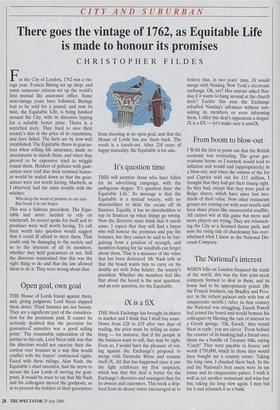The National's interest
WHEN bills on London financed the trade of the world, this was the first joint-stock company formed to deal in them, and its home had to be appropriately grand. (By the Francis brothers, say Bradley and Pevs- ner: in the richest palazzo style with lots of cinquecento motifs.) After its first century the National was struggling. Enoch Powell had joined the board and would bemuse his colleagues by likening the rate of interest to a Greek sponge. 'Oh, Enoch,' they would bleat in reply, 'you are clever.' From behind the counter of its banking hall a friend once threw me a bundle of Treasury bills, saying `Catch!' They were payable to bearer and worth £750,000, which in those days would have bought me a country estate. Taking the long view, I chucked them back. In the end the National's best assets were its tax losses and its cinquecento palace. I wish it well as yet another restaurant and wine-bar but, taking the long view again, I may bid for it and relaunch it as a bank.


























































 Previous page
Previous page